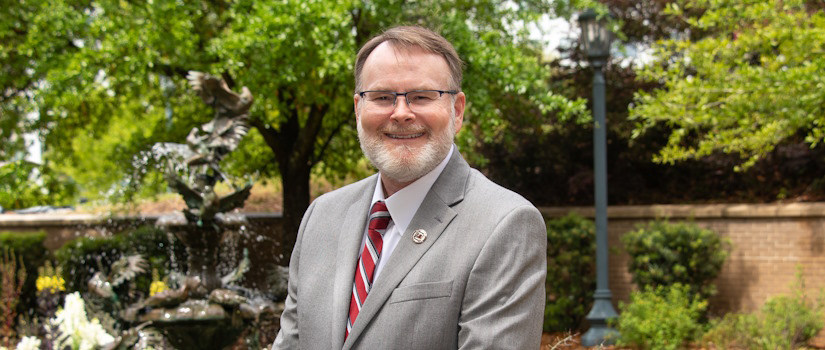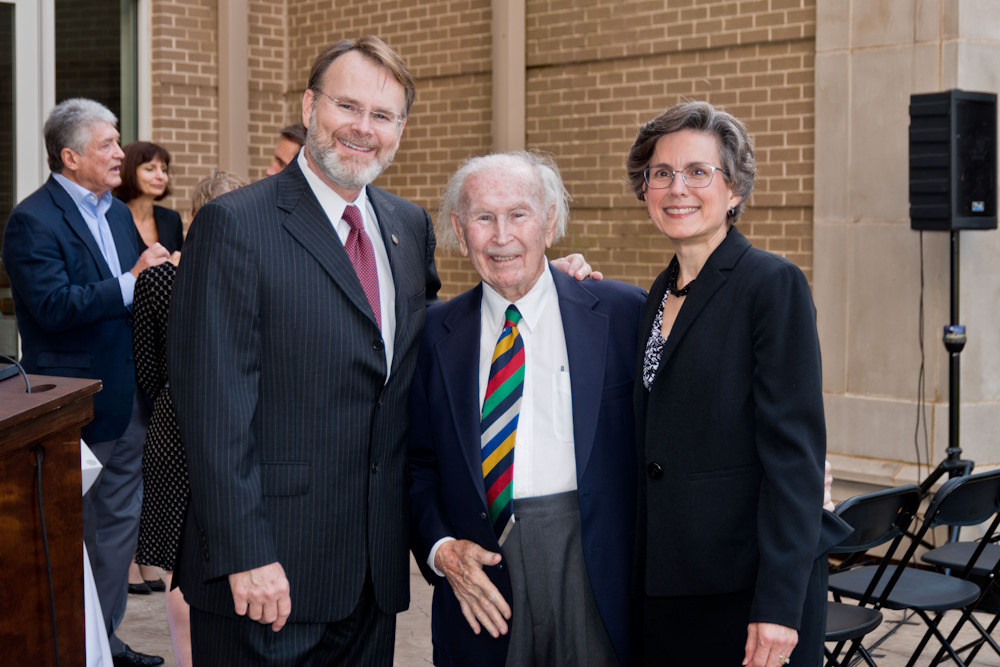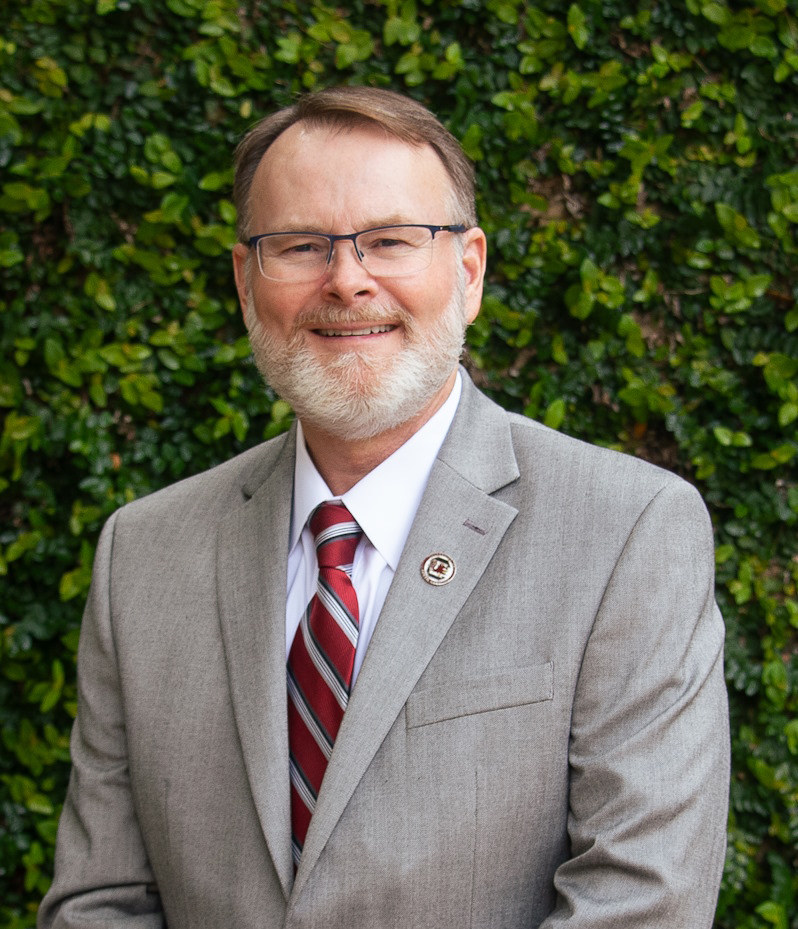April 22, 2024 | Erin Bluvas, bluvase@sc.edu
Though his day-to-day activities as dean will continue for a few more months, Tom Chandler's office is nearly ready for its next occupant – thanks to a recent carpet replacement that compelled him to sort through nearly two decades of professional effects. A nationwide search is underway for the next dean of the Arnold School, and Chandler is prepared to hand over the reins after 17 years as its leader. His office is packed, and, here, he unpacks his reflections on his tenure as dean.
The son of a WWII veteran and a mom who contributed to the war effort through her work at Fort Bragg (now Fort Liberty), Chandler grew up with three sisters in the Mayberry-like town of Hamlet, North Carolina.
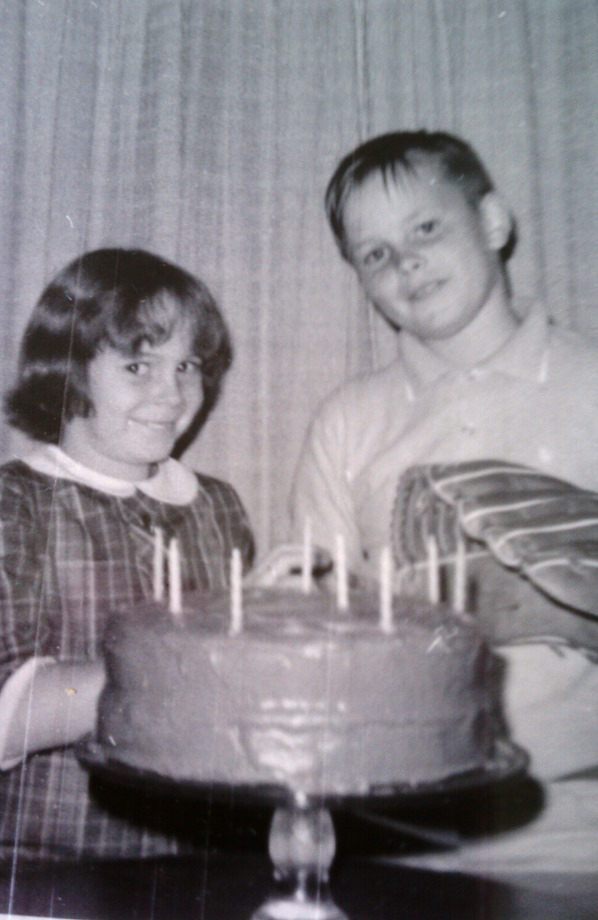
“I was a Jacques Cousteau kid,” he says of his admiration for the oceanographer and TV show host of the early ‘70s, who dedicated his life to exploring and preserving marine environments.
Inspired by Cousteau and other naturalists, by age 12, Chandler already knew he would become a marine biologist. He finally made his move to the coast when he traveled two hours southeast to study biology and marine sciences at the University of North Carolina-Wilmington in 1975.
Immediately following his 1979 commencement, the first-generation college graduate trekked southwest to the Gulf Coast, where he completed master’s and doctoral degrees in zoology at Louisiana State University. His interests initially focused on fish but soon shifted to micro-invertebrate communities that live in mud. Chandler spent seven years conducting field-based research on saltmarsh ecology and polluted systems of the south Louisiana coast – developing an expertise that landed him a Fulbright Postdoctoral Fellowship in coastal meiobenthic ecology at the Universität Hamburg’s Zoologisches Institute in Germany.
Coming to Columbia
As his fellowship wrapped up, Bruce Coull – who would later be named a Carolina Distinguished Professor and dean for USC’s new School of the Environment – recruited Chandler to begin a second postdoctoral fellowship in 1988, this time at the Belle W. Baruch Institute for Marine Biology and Coastal Research. Chandler would stay at the Institute as a research assistant professor for another two years, and Coull would remain an important mentor throughout his scientific career.
"Tommy's Ph.D. advisor at LSU, John Fleeger, had done his Ph.D. under my direction at USC and thus, Tom doing his postdoctoral work with me, was my academic grandchild," says Coull. "He conducted excellent research with his marine biology/environmental expertise and when a position became available in public health he was hired and thereafter developed his wonderful career.”
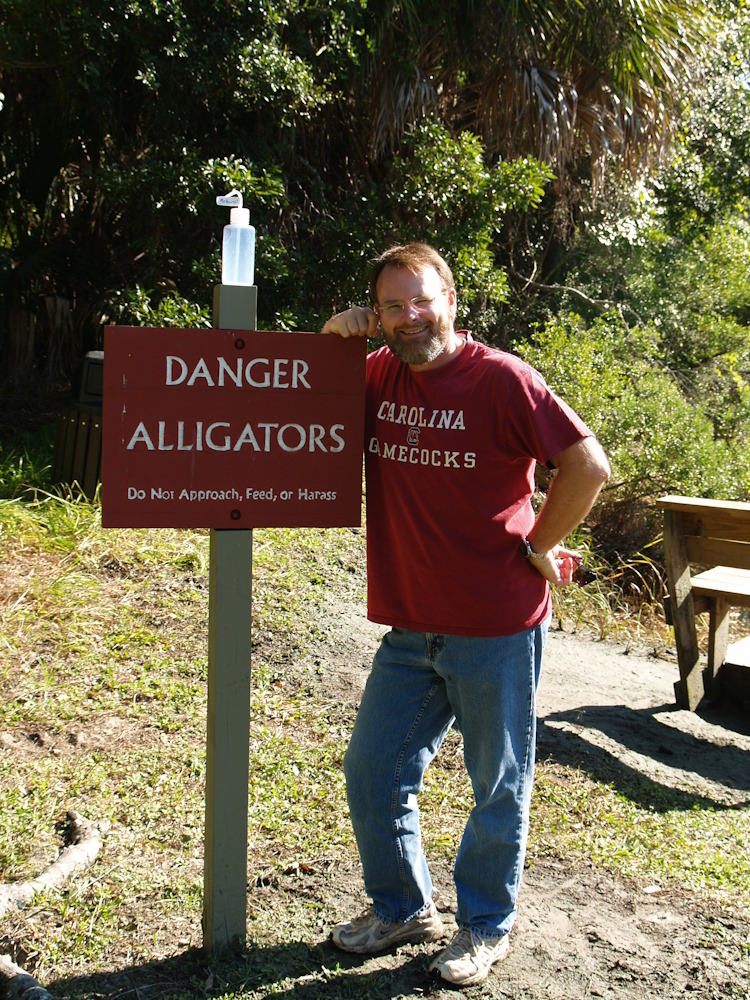
Despite the Institute’s field-lab location along the coast in Georgetown, Chandler’s office was at the main USC campus. He and his wife, Yvette, had settled into the Columbia area and were expecting their third child.
Then Geoff Scott (a tenured associate professor in the Arnold School’s Department of Environmental Health Sciences who would return in 2014 to lead it as chair) left USC in 1990 to take a research scientist position at the National Oceanic & Atmospheric Administration in Charleston. The timing was perfect for Chandler, who had similar expertise as Scott, to join the department and school of public health.
"Tom Chandler and I were a perfect match to collaborate on research as we were both
ecotoxicologists with complementary skills, and we continued to partner on a number
of emerging research issues while I was at NOAA," says Scott. "He developed the first
multigeneration toxicity test for invertebrates, which asseses the effects of transplacental
exposure."
Learning to lead
As an assistant professor, Chandler was immersed in his research and teaching activities – all while raising a family with Yvette. He was in his early 30s when he was asked by Dianne Ward, the interim dean at the time, to take on the department chair position as a newly-tenured associate professor in 1996.
“I was intimidated by the challenges of taking on that leadership role at such an early stage in my career; I was even outranked by more than half of the faculty in the department,” Chandler says. “But I really enjoyed the challenge of getting to know the faculty and their families, and it taught me a lot about the art of compromise and negotiation.”
During his 10 years as chair for environmental health sciences, the department enjoyed tremendous growth and productivity. They had up to 90 graduate students at peak enrollment and enjoyed close partnerships with the South Carolina Department of Health and Environmental Control, NOAA, U.S. Geological Survey and other agencies, which sent their staff to the Arnold School for advanced degrees and hosted USC students to gain experience on special projects.
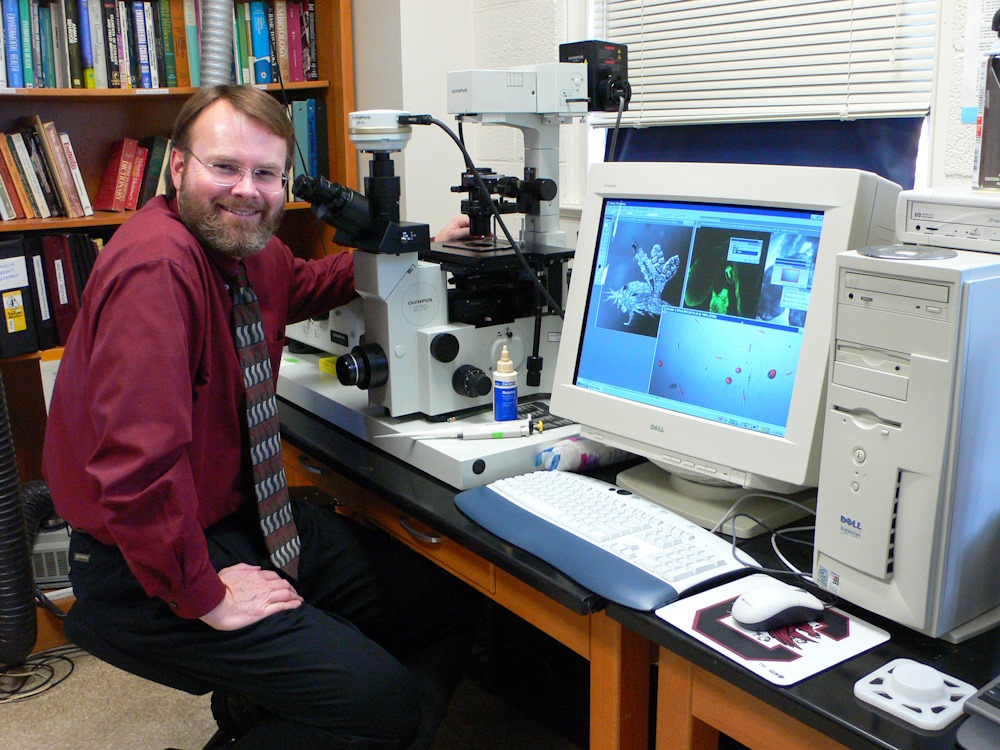
In 2007, Harris Pastides, who had served as dean of the Arnold School and held the position of Vice President for Research and Health Sciences at the time, asked Chandler to step in as interim dean while they conducted a nationwide search to succeed outgoing dean Donna Richter.
During his two years as interim, Chandler would apply the administrative experience
he gained during his decade as chair. Accomplishments during this interim period included
the launch of the Arnold School’s inter-departmental public health bachelor’s programs
(which have grown to become the largest in the nation), tackling the monumental task
of restoring the school’s budget to a favorable state after the massive endeavor to
build the Public Health Research Center (PHRC) on Assembly Street, and stemming the
sizeable exodus of talented faculty recruited by, at the time, stronger schools of
public health. By implementing cost-savings measures, recruiting more graduate students
and new faculty, and securing major federal grants, Chandler and his team erased $3.4
million in debt in just 20 months.
Dedicated to deanship
Eventually, USC leadership convinced Chandler to throw his hat in the ring for the dean position full time. He officially took on the role in August 2009. Chandler had planned to return to his love of working with coastal wetland ecosystems as an environmental toxicologist, but strong support and encouragement from faculty and staff helped him feel comfortable in taking on the permanent deanship.
“Tommy was a young, but already accomplished professor when I became dean of the school in 1998,” says Pastides, who went on to lead the university as president in 2008. “He helped us to achieve rapid growth in externally funded research and helped us design our new building on Assembly Street. I was pleased to appoint him interim dean and as dean, even amongst a field of excellent candidates.”
The past 17 years have seen remarkable upward trajectories in faculty, staff, student and budgetary growth. Forty-five full-time faculty became 155, while staff numbers tripled. Eight students majoring in public health in 2007 grew to more than 1500 today, and exercise science undergraduates now top 1000. The Arnold School is home to 800 graduate students and offers 34 degree and certificate programs. Our clinical programs in speech pathology, physical therapy and athletic training are among the very best in the Southeast.
“All of our undergrads receive careful advising from a dedicated core of more than a dozen full-time professional advisors housed together in the PHRC,” he says of this point of pride. “And our faculty and staff growth has been really fun for me to engage in over the years.”
Chandler has personally participated in over 300 faculty interviews in the past 17 years.
“I have met some remarkably talented and intelligent people doing impactful work for the public good – things like diabetes and cancer prevention, cardiovascular disease prevention, speech and hearing improvement, physical activity promotion, improved childhood and maternal nutrition, coastal environmental protection, etc. etc. etc.,” he says. “We are now truly an international faculty with scholars recruited from more than 20 different countries around the world. Our diversity of thought and activities makes the Arnold School a fun and interesting place to live, work and learn for everyone who’s a part of it.”
Research growth is another large accomplishment of the college under Chandler’s tenure. The school’s grant funding has increased by sevenfold to more than $50 million last year, and peer-reviewed publications have grown by a factor of 10 – exceeding well over 700 journal articles annually at present.
The Arnold School ranks fourth in the country for NIH funding among public universities and first among those without integrated medical center partners. We currently hold 55 R01 or higher-level NIH grants, led by 28 different principal investigators.
“I have no doubt Tommy's impact will continue to reverberate throughout the university for many years and for many reasons,” says Julius Fridriksson, Vice President for the Office of Research and a professor in the Department of Communication Sciences and Disorders. “The momentum he built in the Arnold School of Public Health is unparalleled. Since his tenure began, the school’s growth in journal publications and grant funding are best measured not in percentage points, but in orders of magnitude. During Tommy’s time in the dean’s office, the Arnold School has rocketed up in the NIH rankings.”
“But, equal to these quantifiable achievements are the less tangible, but equally impactful contributions he has made through the supportive mentorship and outstanding motivation he has provided to students and faculty in his years at the University of South Carolina,” Fridriksson adds. “His leadership has made an indelible mark on my own work and that of so many of my colleagues across university leadership, research and teaching. I feel confident speaking for all of us when I say that we will be drawing from those experiences for many years to come.”
With all of this growth, the Arnold School has always been in danger of running out of room. Even in its early days, the PHRC provided only enough space for the school’s administration and undergraduate programs along with the environmental health sciences and exercise science departments and the wet labs they require for their research. The other four departments and some of the exercise science programs (physical therapy and athletic training) remained spread across campus (or even leasing off-campus space) in ten different locations.
Chandler was thrilled to be able to add the nearby Discovery Building to the school’s resources as part of his agreement to become dean in 2009. This enabled the recruitment of an additional 30 tenure-track faculty and brought all but one of the remaining “outside” departments together into new space. Today, the building is filled to capacity with faculty, staff, graduate students and post-docs working on more than 100 grant-funded projects. The addition of a fully-renovated teaching and clinical space in the Close-Hipp building in 2018, thanks to the generosity of Al and Marcia Montgomery, was another major feat – bringing all of the communication sciences and disorders faculty together in one place and back on campus for the first time in decades.
All of these milestones would prove indispensable when the COVID-19 pandemic began in 2020, and the whole of the Arnold School was called into action. The ensuing months shaped Chandler as a leader and as a person.
“For most of us who work in public health, the winter and spring of 2020 will be remembered as a once-in-a-lifetime professional moment. In particular, early March 2020 seemed like the start of a ‘the world will never again be as we know it’ kind of event, and indeed it was,” he says. “Public health as an academic discipline and as a primarily government-delivered and government-regulated practice was about to be forever changed – both in action and with regard to public accountability.”
Like university presidents across the country, then-USC President Bob Caslen reached out to campus leaders to help him make fast and difficult decisions about how to best protect students and families as well as faculty and staff from this highly contagious and deadly virus. Along with Pharmacy Dean Steve Cutler, Chandler was asked to bring a team of the best and brightest to the table.
Arnold School faculty and staff like Melissa Nolan, Sean Norman, Stella Self, Lee Pearson and Debbie Beck helped develop a campus action plan that offered a proactive defensive response to the pandemic. Their model of campus COVID prediction, monitoring and management became a gold standard for the country – leading to visits from the Centers for Disease Control and Prevention and the White House Corona Virus Response Coordinator to learn from USC.
“That period truly was a dark and difficult time for our campus community and for the country, but it was also a moment of great pride for me to see how our faculty, staff and students ALL came together across so many different disciplines and organizations to meet this once-in-a-century challenge,” Chandler says. “Those infrequent but challenging times are the best times for any leader – when the disparate talents of many folks can be brought together and marshalled to produce an outcome that is unexpected and so much more than the sum of the individual parts.”
Another major highlight – and certainly more positive – has been Chandler’s relationship with the school’s name sakes, Norman J. and Gerry Sue Arnold. He enjoyed visiting the Arnolds over the years to have a glass of wine and hear stories about their interesting lives and the pride they took in their school.
“The Arnold family gave $17 million in two large gifts that became transformational endowments for the college,” he says. “These funds are being used to support studies of healthy aging across the lifespan, and many dozens of doctoral students have benefitted from substantial tuition supports provided via these gifts.”
When Norman passed away in 2016 at 86, Chandler continued the family partnership with their son, Ben, who plans to help the school thrive for years to come.
“Ben’s advice on philanthropic networking and how to get buildings out of the ground has been incredibly useful in the past few years as we look ahead to furthering our phenomenal growth,” says Chandler.
To that end, Chandler will be handing the new dean the reins of a herd – not a horse. The school’s continued growth demands the addition of another 100K-150K square-foot building that will cost approximately $100-120 million.
“We have started fundraising for this effort, and President Amiridis is very supportive
of us moving forward with a plan for sustained growth,” Chandler says. “We need everyone’s
help! Even small gifts add up when you consider how many alumni and friends of the
Arnold School are out there who are proud of us and who have always had our backs.
Our hope is to have much of this cost raised within the next three-to-five years as
part of the coming university-wide $1.5 billion capital campaign.”
Returning to his roots
Despite dedicating much of his career to leadership (28 years in total), Chandler has published more than 100 scientific papers and has been well-funded by agencies such as the National Science Foundation, NOAA and Environmental Protection Agency. He has received two USC awards for research excellence and held advisory and other service leadership positions within his field as well as countless administrative roles for the university. All while keeping a personable demeanor and positive attitude.
“Often, when an era of successful leadership ends, there is anxiety and foreboding, but Tom is leaving the Arnold School of Public Health with a wide-open path to continued success,” Pastides says. “He has fulfilled the promise of strong leadership in research growth, educational innovation and robust public outreach. And on a personal note, I have always enjoyed his humor, including his willingness to poke fun at those who abandoned their scientific path for higher administration! Choosing the Arnold School's next dean is a critical challenge, but I expect there to be a deep and qualified pool of candidates based on where Tom Chandler has taken the school. I wish all the best to Tom, Yvette and their family.”
For Chandler, the transition is an opportunity to return to his first loves: family and being a faculty member. He is looking forward to resuming his studies in environmental toxicology and rejoining superb colleagues.
“I don’t like to be idle,” Chandler says. “Hopefully someone will have some need that I might be able to help with, and I do hope to travel to see a few international colleagues over the coming months – old friends who I have seen too little of since becoming a full-time administrator. It will be very nice to see more of my wife and grandkids as well. Yvette has sacrificed a lot to allow me to pursue my professional passions. I love her very much, and I see travel and grandkids in our future.”
The moment of passing the baton is timely given that the Arnold School will mark its 50th anniversary in 2025. It’s a turning of the page in which its new leader can look toward the future while building on the momentum and success of the school’s recent and long-term past. With his lengthy tenure, Chandler has had the rare opportunity to both witness and facilitate this remarkable growth.
“As a fellow first-generation student, Tom Chandler has not only exemplified the pursuit of academic excellence but also set an example as a leader both at the university and within his field," says Provost Donna Arnett. "USC has benefitted from his leadership at many levels – from department chair, dean and vice provost for USC health sciences to serving on advisory board working groups at NOAA and OECD – and we are thankful for his years of service.”
“Almost everything in my 17 years as dean has been positive, personally and professionally enriching, and enjoyable. I have met so many interesting students and faculty from all over the country and the world, and I have been able to travel and create partnerships with universities in numerous countries,” he says. “I am so fortunate to have had close working relationships with university leadership, who have all been strongly supportive of what we tried to build and accomplish here in the Arnold School.”
“As one of USC’s longest-serving deans, Tom Chandler has long been a source of trusted insight and thoughtful leadership at the Arnold School,” President Michael Amiridis says. “We are grateful for his contributions to our university and to the state throughout his distinguished academic career.”
